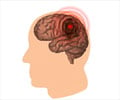Elderly people who have had a stroke or mini-stroke benefit from cholesterol-lowering drugs just as much as younger people in the same situation, according to a new research led by
Elderly people who have had a stroke or mini-stroke benefit from cholesterol-lowering drugs just as much as younger people in the same situation, according to a new research led by an Indian-origin scientist.
The study has been published in the September 3, 2008, online issue of Neurology, the medical journal of the American Academy of Neurology."Even though the majority of strokes and heart attacks occur in people who are 65 and older, studies have found that cholesterol-lowering drugs are not prescribed as often for older people as they are for younger people," said study author Seemant Chaturvedi, MD, of Wayne State University in Detroit, MI, and a Fellow of the American Academy of Neurology.
"These results show that using these drugs is just as beneficial for people who are over 65 as they are for younger people," Chaturvedi added.
The research involved 4,731 people age 18 and older who had a recent stroke or transient ischemic attack, or mini-stroke. The 2,249 people age 65 and older were in one group, with an average age of 72, and the 2,482 people under age 65 made up the other group, with an average age of 54.
Within each group, about half of the people received the cholesterol-lowering drug atorvastatin and about half received a placebo.
The participants were then followed for an average of four and a half years.
Advertisement
hose in the younger group reduced their risk for another stroke by 26 percent; the risk was reduced by 10 percent in the elderly group.
Advertisement
"It's estimated that 20 percent of the U.S. population will be 65 or older by 2010, so it's important that we identify ways to reduce the burden of strokes and other cerebrovascular diseases in this group. This is a step in that direction."
Source-ANI
SRM














